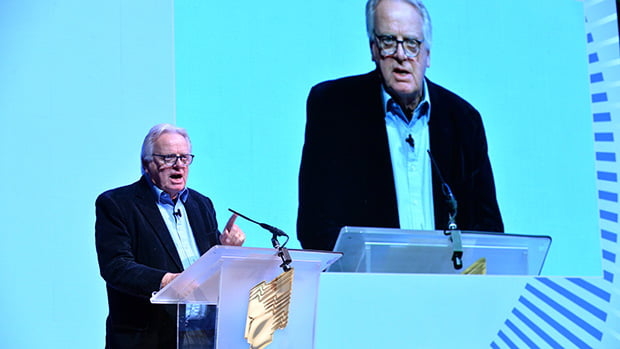New Ofcom chair Lord Grade puts big tech on notice over online harms

Michael Grade at RTS London
RTS: Michael Grade, newly appointed chairman of UK media regulator Ofcom, says big tech and social media platforms need to “shift their mindset” around online harms and has called for “a new era of accountability.”
Speaking at the Royal Television Society (RTS)’s annual conference in London on Tuesday, Lord Grade, a former CEO of Channel 4 and chairman of both the BBC and ITV, said Ofcom was “not waiting for royal ascent” of the government’s flagship online safety bill.
The watchdog is already planning to impose tighter restrictions and regulations on social media and big tech, he said, and encouraged tech companies to join it in preparing for the legislation’s enactment.
“Clearly we must be realistic given the impossible attempt to assess online content as we do TV and radio, and even if we could regulate every piece of online content we’d only be treating the symptoms of online harm,” Grade said. “Parliament, correctly, wants us to get to the cause – shining a light on the decisions companies take in designing and operating their services.
“The bill lays the burden on platforms to reduce harm. We want to shift their mindset. We need a new era of accountability where companies have to prioritise trust and safety on equal terms with clicks and profits. We know many do take steps to protect users but these have not been sufficient to restore people’s trust and confidence.
He added that big tech firms need to shift their regulatory responsibility from the public policy part, where they sit today, to the frontline staff responsible for designing and operating these services.
“At the moment we see online regulation being accepted and well understood by those whose job it is in the tech companies to worry about such things – the policy and strategy teams,” Grade continued. “But, like bankers who think their compliance department belongs to a galaxy far, far away, those who design and operate tech platforms are not routinely touched by safety concerns.”
Grade, who was appointed in April, said the planned laws would not be a “miracle cure for the internet’s every ill” but would allow Ofcom to summon people with the day-to-day responsibility for users’ safety on the sites and apps themselves, and would be a “meaningful overview shift in the regulatory culture of big tech.”
“The industry will need to hone a culture of responsibility towards its users,” he concluded.
Grade also used his RTS keynote to lament the tone of public debate, particularly on social media, and political interviews. Conservative leadership candidate Rishi Sunak being asked if he was “slick and rich” during leadership hustings felt particularly inappropriate, according to the Conservative peer.
“Traditionalists and progressive groups are locked in a seemingly endless struggle to impose their view of the world, their beliefs, their values, their vocabulary,” Grade said.
“Important, divisive issues, from Brexit to Covid restrictions or personal rights, have become angry battlefields of bitter division. I’ve had debates with politicians all of my life, some of them quite heated, but when these important debates cross the line and are conducted with aggression, prejudice or tone that borders on hateful, we all lose something.”
However, he went on to say: “Ofcom does not and should not regulate the culture wars.” As examples he cited controversial host Piers Morgan’s on-air comments about Meghan Markle and a performance on Britain’s Got Talent by music group Diversity that included a Black Lives Matters gesture. Last year only 29 of the 11,000 complaints the regulator received were upheld, he added.
“Some try to conscript us to their cause, but we’re not interested, that’s not our job,” he continued. “Whether we’re judging that Piers Morgan’s comments about the Duchess of Sussex were justified by freedom of expression, or that Diversity’s tribute to the Black Lives Matters movement was too, we never make decisions based on personal preference, political pressure, fear or favour.
“We all leave our various opinions at the door and focus on the legal framework and the duties given to us by parliament. We make careful, balanced decisions based on evidence.”













.jpg)




























